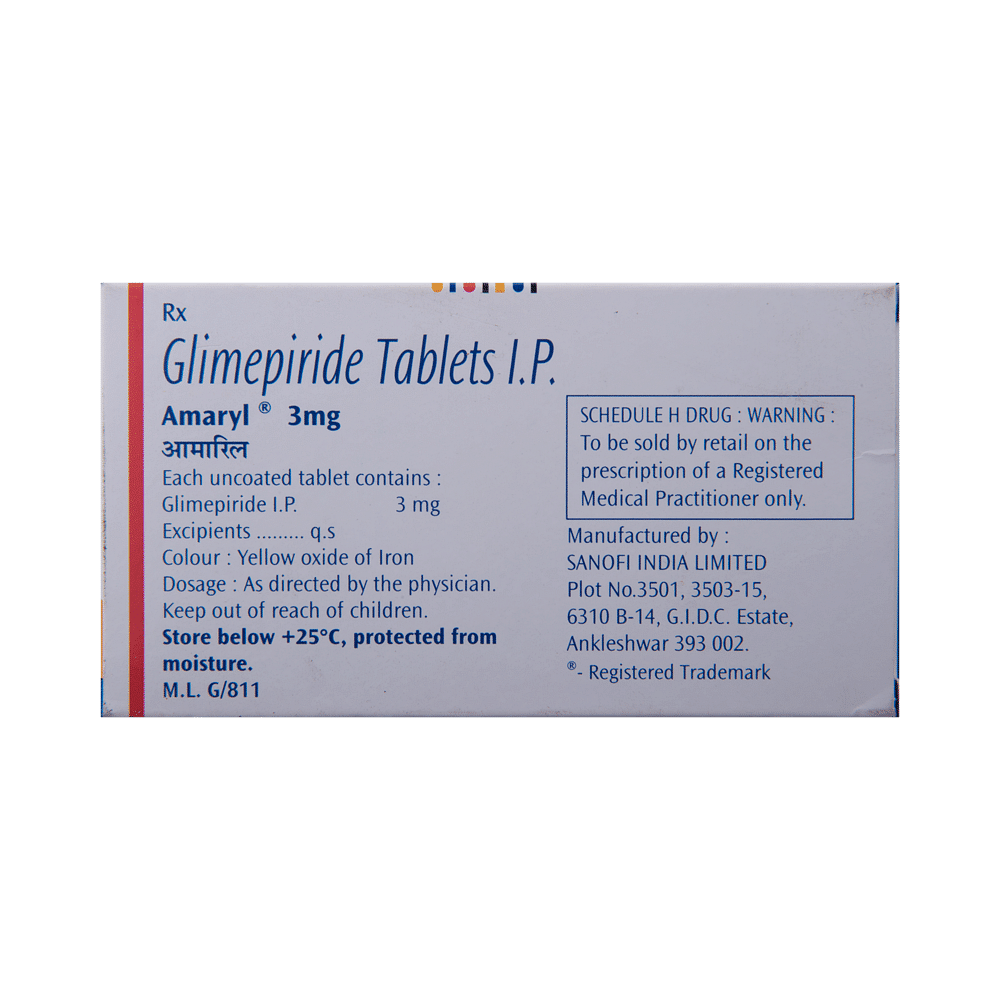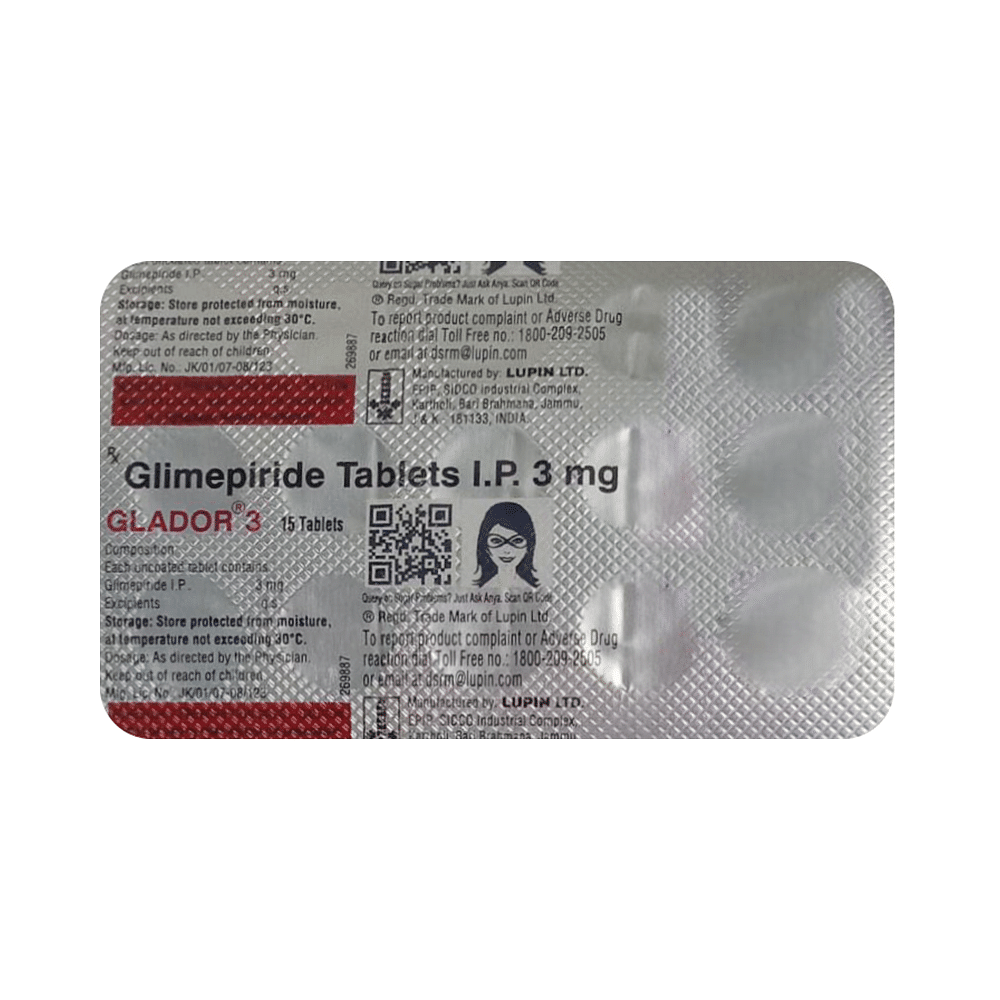




Glimestar 3 Tablet
Manufacturer
Mankind Pharma Ltd
Salt Composition
Glimepiride (3mg)
Key Information
Short Description
Glimestar 3 Tablet is a sulfonylurea medication used to treat type 2 diabetes mellitus in adults, helping to control blood sugar levels and prevent complications.
Dosage Form
Tablet
Introduction
Glimestar 3 Tablet is an antidiabetic medication that belongs to a group of medicines called sulfonylureas. It is used to treat type 2 diabetes mellitus in adults. It helps control blood sugar levels in people with diabetes thereby preventing serious complications of diabetes such as kidney damage and blindness.
Directions for Use
Take this medicine in the dose and duration as advised by your doctor. Swallow it as a whole. Do not chew, crush or break it. Glimestar 3 Tablet is to be taken with food.
How it works
Glimestar 3 Tablet is an antidiabetic medication. It works by increasing the amount of insulin released by the pancreas in order to lower blood glucose.
Quick Tips
Take Glimestar 3 Tablet shortly before or with the first main meal of the day (usually breakfast) Exercise regularly Eat a healthy diet and take your other diabetes medicines (if prescribed) alongside Monitor your blood sugar level regularly while you are taking Glimestar 3 Tablet Be careful while driving or operating machinery until you know how Glimestar 3 Tablet affects you
Related Medicines

Amaryl 3mg Tablet

Glador 3 Tablet

Glimiprex 3 Tablet

Zoryl 3 Tablet

GP-3 Tablet

Glitic 3mg Tablet

Vedapride 3mg Tablet

Gemix 3mg Tablet

Glimy M 3mg Tablet

Glyzee 3 Tablet
Frequently asked questions
What is the dosage of Glimestar 3 Tablet?
The recommended starting dose of Glimestar 3 Tablet is 1 mg or 2 mg once daily, administered with breakfast. If you are at a higher risk of low blood sugar (e.g., the elderly or patients with renal impairment), you will be given a starting dose of 1 mg once daily. The usual maintenance dose is 1–4 mg once daily. The maximum recommended dose is 8 mg once daily. After reaching a daily dose of 2 mg, the dosage will be increased not more than 2 mg at 1- to 2-week intervals, based on your blood glucose level.
Does Glimestar 3 Tablet make you sleepy?
Glimestar 3 Tablet itself does not cause sleepiness. However, it may cause hypoglycemia (low blood sugar) when used with other anti-diabetes medicine. Because of this you may feel sleepy or have problems in sleeping.
Is Glimestar 3 Tablet safe for kidneys?
Glimestar 3 Tablet does not affect kidneys in patients with normal kidney function. However, its use should be avoided in patients with severe kidney disease since Glimestar 3 Tablet is principally eliminated by the kidneys.
Does Glimestar 3 Tablet cause memory loss?
No, it is not known that Glimestar 3 Tablet causes memory loss. However, the use of Glimestar 3 Tablet may cause low blood sugar which may cause problems with concentration and reduced alertness.
Can I take Glimestar 3 Tablet during pregnancy or breastfeeding?
Please consult a doctor before taking any medication during pregnancy or breastfeeding. It's crucial to get professional medical advice for safe and personalized recommendations.
What are the side effects of Glimestar 3 Tablet?
Side effects may vary from person to person, but some common ones include dizziness, nausea, vomiting, diarrhea, or a change in appetite. If you experience severe or persistent side effects, contact your doctor immediately.
Can Glimestar 3 Tablet cause weight gain?
Yes, Glimestar 3 Tablet can cause weight gain due to its effect on insulin production and metabolism. However, maintaining a healthy diet and exercise regime is crucial to manage this side effect.
What should I avoid when taking Glimestar 3 Tablet?
It's important to consult your doctor for specific dietary recommendations regarding Glimestar 3 Tablet. However, generally, you should limit processed foods and refined sugars while consuming high-fiber and low-glycemic index meals.
Is Glimestar 3 Tablet safe?
Yes, when used as prescribed by a doctor and followed carefully. However, it's essential to be aware of the potential side effects and consult your doctor if you experience any concerns.
What are the dietary restrictions for people with diabetes?
A proper diet plays a crucial role in managing diabetes. It is recommended to consume a balanced diet rich in fruits, vegetables, whole grains, and lean proteins. Limiting sugars, processed foods, trans fats, and saturated fats is essential.
What are the long-term effects of untreated diabetes?
Untreated diabetes can lead to serious health complications over time. These include heart disease, stroke, nerve damage, kidney failure, vision loss, and even amputation.


